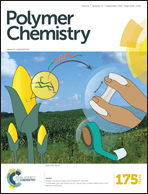Activated carbonates: enabling the synthesis of differentiated polycarbonate resins via melt transcarbonation†
Abstract
Activated carbonates facilitate the preparation of polycarbonates based on monomers that are unsuitable for traditional melt polymerization at high temperatures. Bis(methyl salicyl) carbonate (BMSC) clearly shows reactivity benefits over diphenyl carbonate in melt polymerization reactions, resulting in shorter reaction times and reduced heat exposure during polymerization. The increased reactivity enables the melt polymerization of a wide range of monomers, as demonstrated by two examples using volatile resorcinol and sterically hindered tert-butyl hydroquinone as monomers in the preparation of (co)polycarbonates.


 Please wait while we load your content...
Please wait while we load your content...